
The Blonde Nightingale is a 1930 German musical film directed by Johannes Meyer and starring Ernst Behmer, Else Elster and Erich Kestin.

A Student's Song of Heidelberg is a 1930 German musical film directed by Karl Hartl and starring Hans Brausewetter, Betty Bird and Willi Forst. It marked Hartl's directoral debut. The film is in the tradition of the nostalgic Old Heidelberg.

Chased by the Devil is a 1950 West German crime film directed by Viktor Tourjansky and starring Hans Albers, Willy Birgel and Lil Dagover.

Triad is a 1938 German drama film directed by Hans Hinrich and starring Lil Dagover, Paul Hartmann and Rolf Moebius.

Chronicles of the Gray House is a 1925 German silent historical drama film directed by Arthur von Gerlach and starring Paul Hartmann, Rudolf Forster and Lil Dagover.
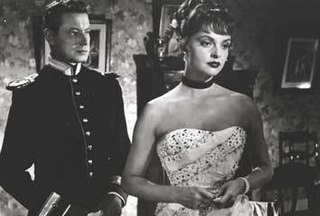
The Barrings is a 1955 West German historical drama film directed by Rolf Thiele and starring Dieter Borsche, Nadja Tiller and Paul Hartmann. It was shot at the Göttingen Studios with sets designed by the art director Walter Haag.

The Day Before the Wedding is a 1952 West German comedy film directed by Rolf Thiele and starring Paul Dahlke, Elisabeth Müller, and Joachim Brennecke. It was shot at the Göttingen Studios. The film's sets were designed by the art director Walter Haag.
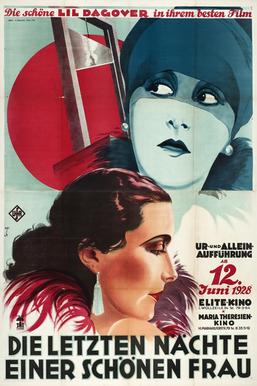
Attorney for the Heart is a 1927 German silent romance film directed by Wilhelm Thiele and starring Lil Dagover, Jean Murat, and Ernst Stahl-Nachbaur. The film's sets were designed by the art director Alexander Ferenczy.
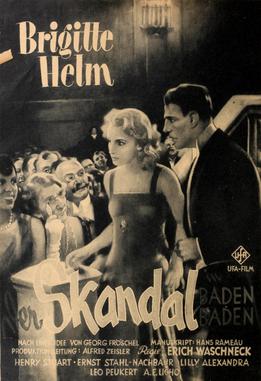
Scandal in Baden-Baden is a 1929 German silent drama film directed by Erich Waschneck and starring Brigitte Helm, Ernst Stahl-Nachbaur and Henry Stuart. It was shot at the Babelsberg Studios in Berlin and on location in Baden-Baden. The film's sets were designed by the art director Erich Czerwonski.
The Bull of Olivera is a 1921 German silent historical drama film directed by Erich Schönfelder and starring Emil Jannings. It was shot at the Tempelhof Studios in Berlin. The film's art direction was by Kurt Richter. It premiered at the Ufa-Palast am Zoo.

There Is a Woman Who Never Forgets You is a 1930 German drama film directed by Leo Mittler and starring Iván Petrovich, Lil Dagover and Helene Fehdmer. Its shooting had originally begun as a silent film at the Staaken Studios before switching to sound at the newly converted Tempelhof Studios in Berlin. The film's sets were designed by the art directors Hans Sohnle and Otto Erdmann.

Turtledove General Delivery is a 1952 West German comedy film directed by Gerhard T. Buchholz and starring Horst Niendorf, Barbara Rütting and Heinz Schacht. The title is a reference to the Poste restante mail service, which is used as a contact point by the film's characters. The film portrays a number of residents of East Germany who decide to escape to the West.

Red Roses, Red Lips, Red Wine is a 1953 West German romantic drama film directed by Paul Martin and starring Gardy Granass, John Van Dreelen, and Rolf von Nauckhoff. It shares its title with a popular song of the same era. It was made at the Tempelhof Studios in West Berlin. The film's sets were designed by the art director Erich Kettelhut.
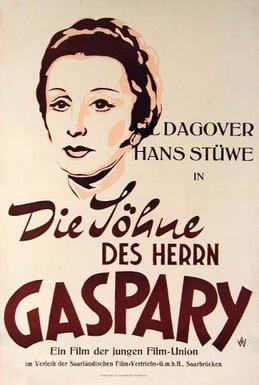
Gaspary's Sons is a 1948 German drama film directed by Rolf Meyer and starring Lil Dagover, Hans Stüwe and Inge Landgut. It was shot at the Bendestorf Studios near Hamburg and on location at Kleinwalsertal in western Austria. The film's sets were designed by the art director Erich Grave.

The Daredevil is a 1931 German crime film directed by Richard Eichberg and starring Hans Albers, Gerda Maurus and Mártha Eggerth.
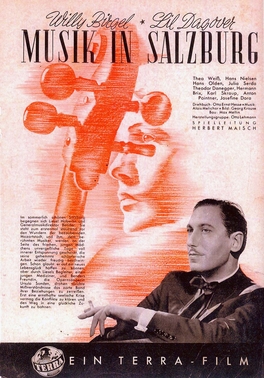
Music in Salzburg is a 1944 German comedy film directed by Herbert Maisch and starring Willy Birgel, Lil Dagover and Hans Nielsen.It was shot at the Babelsberg Studios in Berlin and on location around Salzburg. The film's sets were designed by the art director Max Mellin.

The Dancer of Sanssouci is a 1932 German historical drama film directed by Frederic Zelnik and starring Otto Gebühr, Lil Dagover, and Rosa Valetti. Set at the court of Frederick the Great, the film is part of a group of Prussian films made during the era. It portrays the interaction between Frederick and the celebrated dancer Barberina Campanini. Gebühr had previously appeared as Frederick in a silent film The Dancer Barberina about their relationship.
The Mask is a 1919 German silent crime film directed by Ewald André Dupont and starring Max Landa, Lil Dagover and Gertrude Welcker.

One Woman Is Not Enough? is a 1955 West German drama film directed by Ulrich Erfurth and starring Hilde Krahl, Hans Söhnker and Rudolf Forster. It was shot at the Tempelhof Studios in West Berlin and on location in Munich and around Lake Starnberg. The film's sets were designed by the art directors Erich Kettelhut and Johannes Ott.

Helene Willfüer, Student of Chemistry is a 1930 German silent drama film directed by Fred Sauer and starring Olga Chekhova, Ernst Stahl-Nachbaur and Elza Temary. It is based on the 1928 novel of the same title by Vicki Baum, which was subsequently remade as the 1936 French film Hélène and the 1956 West German film Studentin Helene Willfüer. The film's sets were designed by the art director Max Heilbronner. Location shooting took place around Heidelberg.


















